- Home
- Leo Tolstoy
Family Happiness and Other Stories Page 13
Family Happiness and Other Stories Read online
Page 13
The oarsmen pulled in to the shore, and held on with the boathook while the bishop got out.
The old men bowed to him, and he gave them his blessing, at which they bowed still lower. Then the bishop began to speak to them.
“I have heard,” he said, “that you, godly men, live here saving your own souls and praying to our Lord Christ for your fellow men. I, an unworthy servant of Christ, am called, by God’s mercy, to keep and teach his flock. I wished to see you, servants of God, and to do what I can to teach you, also.”
The old men looked at each other smiling, but remained silent.
“Tell me,” said the bishop, “what you are doing to save your souls, and how you serve God on this island.”
The second hermit sighed, and looked at the oldest, the very ancient one. The latter smiled, and said:
“We do not know how to serve God. We only serve and support ourselves, servant of God.”
“But how do you pray to God?” asked the bishop.
“We pray in this way,” replied the hermit. “Three are ye, three are we, have mercy upon us.”
And when the old man said this, all three raised their eyes to heaven, and repeated:
“Three are ye, three are we, have mercy upon us!”
The bishop smiled.
“You have evidently heard something about the Holy Trinity,” said he. “But you do not pray aright. You have won my affection, godly men. I see you wish to please the Lord, but you do not know how to serve him. That is not the way to pray; but listen to me, and I will teach you. I will teach you, not a way of my own, but the way in which God in the Holy Scriptures has commanded all men to pray to him.”
And the bishop began explaining to the hermits how God had revealed himself to men; telling them of God the Father, and God the Son, and God the Holy Ghost.
“God the Son came down on earth,” said he, “to save men, and this is how he taught us all to pray. Listen, and repeat after me: ‘Our Father.’ ”
And the first old man repeated after him, “Our Father,” and the second said, “Our Father,” and the third said, “Our Father.”
“Which art in heaven,” continued the bishop.
The first hermit repeated, “Which art in heaven,” but the second blundered over the words, and the tall hermit could not say them properly. His hair had grown over his mouth so that he could not speak plainly. The very old hermit, having no teeth, also mumbled indistinctly.
The bishop repeated the words again, and the old men repeated them after him. The bishop sat down on a stone, and the old men stood before him, watching his mouth, and repeating the words as he uttered them. And all day long the bishop labored, saying a word twenty, thirty, a hundred times over, and the old men repeated it after him. They blundered, and he corrected them, and made them begin again.
The bishop did not leave off till he had taught them the whole of the Lord’s Prayer so that they could not only repeat it after him, but could say it by themselves. The middle one was the first to know it, and to repeat the whole of it alone. The bishop made him say it again and again, and at last the others could say it too.
It was getting dark, and the moon was appearing over the water, before the bishop rose to return to the vessel. When he took leave of the old men they all bowed down to the ground before him. He raised them, and kissed each of them, telling them to pray as he had taught them. Then he got into the boat and returned to the ship.
And as he sat in the boat and was rowed to the ship he could hear the three voices of the hermits loudly repeating the Lord’s Prayer. As the boat drew near the vessel their voices could no longer be heard, but they could still be seen in the moonlight, standing as he had left them on the shore, the shortest in the middle, the tallest on the right, the middle one on the left. As soon as the bishop had reached the vessel and got on board, the anchor was weighed and the sails unfurled. The wind filled them and the ship sailed away, and the bishop took a seat in the stern and watched the island they had left. For a time he could still see the hermits, but presently they disappeared from sight, though the island was still visible. At last it too vanished, and only the sea was to be seen, rippling in the moonlight.
The pilgrims lay down to sleep, and all was quiet on deck. The bishop did not wish to sleep, but sat alone at the stern, gazing at the sea where the island was no longer visible, and thinking of the good old men. He thought how pleased they had been to learn the Lord’s Prayer; and he thanked God for having sent him to teach and help such godly men.
So the bishop sat, thinking, and gazing at the sea where the island had disappeared. And the moonlight flickered before his eyes, sparkling, now here, now there, upon the waves. Suddenly he saw something white and shining, on the bright path which the moon cast across the sea. Was it a seagull, or the little gleaming sail of some small boat? The bishop fixed his eyes on it, wondering.
“It must be a boat sailing after us,” thought he, “but it is overtaking us very rapidly. It was far, far away a minute ago, but now it is much nearer. It cannot be a boat, for I can see no sail; but whatever it may be, it is following us, and catching us up.”
And he could not make out what it was. Not a boat, nor a bird, nor a fish! It was too large for a man, and besides a man could not be out there in the midst of the sea. The bishop rose, and said to the helmsman:
“Look there, what is that, my friend? What is it?” the bishop repeated, though he could now see plainly what it was—the three hermits running upon the water, all gleaming white, their grey beards shining, and approaching the ship as quickly as though it were not moving.
The steersman looked, and let go the helm in terror.
“Oh Lord! The hermits are running after us on the water as though it were dry land!”
The passengers, hearing him, jumped up and crowded to the stern. They saw the hermits coming along hand in hand, and the two outer ones beckoning the ship to stop. All three were gliding along upon the water without moving their feet. Before the ship could be stopped, the hermits had reached it, and raising their heads, all three as with one voice, began to say:
“We have forgotten your teaching, servant of God. As long as we kept repeating it we remembered, but when we stopped saying it for a time, a word dropped out, and now it has all gone to pieces. We can remember nothing of it. Teach us again.”
The bishop crossed himself, and leaning over the ship’s side, said:
“Your own prayer will reach the Lord, men of God. It is not for me to teach you. Pray for us sinners.”
And the bishop bowed low before the old men; and they turned and went back across the sea. And a light shone until daybreak on the spot where they were lost to sight.
The Devil
But I say unto you, that every one that looketh on a woman to lust after her hath committed adultery with her already in his heart.
And if thy right eye causeth thee to stumble, pluck it out, and cast it from thee: for it is profitable for thee that one of thy members should perish, and not thy whole body be cast into hell.
And if thy right hand causeth thee to stumble, cut it off, and cast it from thee: for it is profitable for thee that one of thy members should perish, and not thy whole body go into hell.—Matt. v. 28, 29, 30
I
A BRILLIANT career lay before Eugene Irtenev. He had everything necessary to attain it: an admirable education at home, high honors when he graduated in law at Petersburg University, and connections in the highest society through his recently deceased father; he had also already begun service in one of the ministries under the protection of the minister. Moreover he had a fortune; even a large one, though insecure. His father had lived abroad and in Petersburg, allowing his sons, Eugene and Andrew (who was older than Eugene and in the Horse Guards), six thousand rubles a year each, while he himself and his wife spent a great deal. He only used to visit his estate for a couple of months in summer and did not concern himself with its direction, entrusting it all to an unscrupulous manager who al
so failed to attend to it, but in whom he had complete confidence.
After the father’s death, when the brothers began to divide the property, so many debts were discovered that their lawyer even advised them to refuse the inheritance and retain only an estate left them by their grandmother, which was valued at a hundred thousand rubles. But a neighboring landed proprietor who had done business with old Irtenev, that is to say, who had promissory notes from him and had come to Petersburg on that account, said that in spite of the debts they could straighten out affairs so as to retain a large fortune (it would only be necessary to sell the forest and some outlying land, retaining the rich Semyonov estate with four thousand desyatins13 of black earth, the sugar factory, and two hundred desyatins of water meadows) if one devoted oneself to the management of the estate, settled there, and farmed it wisely and economically.
And so, having visited the estate in spring (his father had died in Lent), Eugene looked into everything, resolved to retire from the civil service, settle in the country with his mother, and undertake the management with the object of preserving the main estate. He arranged with his brother, with whom he was very friendly, that he would pay him either four thousand rubles a year, or a lump sum of eighty thousand, for which Andrew would hand over to him his share of his inheritance.
So he arranged matters and, having settled down with his mother in the big house, began managing the estate eagerly, yet cautiously.
It is generally supposed that Conservatives are usually old people, and that those in favor of change are the young. That is not quite correct. Usually Conservatives are young people: those who want to live but who do not think about how to live, and have not time to think, and therefore take as a model for themselves a way of life that they have seen.
Thus it was with Eugene. Having settled in the village, his aim and ideal was to restore the form of life that had existed, not in his father’s time—his father had been a bad manager—but in his grandfather’s. And now he tried to resurrect the general spirit of his grandfather’s life—in the house, the garden, and in the estate management—of course with changes suited to the times—everything on a large scale—good order, method, and everybody satisfied. But to do this entailed much work. It was necessary to meet the demands of the creditors and the banks, and for that purpose to sell some land and arrange renewals of credit. It was also necessary to get money to carry on (partly by farming out land, and partly by hiring labor) the immense operations on the Semyonov estate, with its four hundred desyatins of ploughland and its sugar factory, and to deal with the garden so that it should not seem to be neglected or in decay.
There was much work to do, but Eugene had plenty of strength—physical and mental. He was twenty-six, of medium height, strongly built, with muscles developed by gymnastics. He was full-blooded and his whole neck was very red, his teeth and lips were bright, and his hair soft and curly though not thick. His only physical defect was shortsightedness, which he had himself developed by using spectacles, so that he could not now do without a pince-nez, which had already formed a line on the bridge of his nose.
Such he was physically. For his spiritual portrait it might be said that the better people knew him the better they liked him. His mother had always loved him more than anyone else, and now after her husband’s death she concentrated on him not only her whole affection but her whole life. Nor was it only his mother who so loved him. All his comrades at the high school and the university not merely liked him very much, but respected him. He had this effect on all who met him. It was impossible not to believe what he said, impossible to suspect any deception or falseness in one who had such an open, honest face and in particular such eyes.
In general his personality helped him much in his affairs. A creditor who would have refused another trusted him. The clerk, the village elder, or a peasant, who would have played a dirty trick and cheated someone else, forgot to deceive under the pleasant impression of intercourse with this kindly, agreeable, and above all candid man.
It was the end of May. Eugene had somehow managed in town to get the vacant land freed from the mortgage, so as to sell it to a merchant, and had borrowed money from that same merchant to replenish his stock, that is to say, to procure horses, bulls, and carts, and in particular to begin to build a necessary farmhouse. The matter had been arranged. The timber was being carted, the carpenters were already at work, and manure for the estate was being brought on eighty carts, but everything still hung by a thread.
II
Amid these cares something came about which though unimportant tormented Eugene at the time. As a young man he had lived as all healthy young men live, that is, he had had relations with women of various kinds. He was not a libertine but neither, as he himself said, was he a monk. He only turned to this, however, in so far as was necessary for physical health and to have his mind free, as he used to say. This had begun when he was sixteen and had gone on satisfactorily—in the sense that he had never given himself up to debauchery, never once been infatuated, and had never contracted a disease. At first he had had a seamstress in Petersburg, then she got spoilt and he made other arrangements, and that side of his affairs was so well secured that it did not trouble him.
But now he was living in the country for the second month and did not at all know what he was to do. Compulsory self-restraint was beginning to have a bad effect on him.
Must he really go to town for that purpose? And where to? How? That was the only thing that disturbed him; but as he was convinced that the thing was necessary and that he needed it, it really became a necessity, and he felt that he was not free and that his eyes involuntarily followed every young woman.
He did not approve of having relations with a married woman or a maid in his own village. He knew by report that both his father and grandfather had been quite different in this matter from other landowners of that time. At home they had never had any entanglements with peasant women, and he had decided that he would not do so either; but afterwards, feeling himself ever more and more under compulsion and imagining with horror what might happen to him in the neighboring country town, and reflecting on the fact that the days of serfdom were now over, he decided that it might be done on the spot. Only it must be done so that no one should know of it, and not for the sake of debauchery but merely for health’s sake—as he said to himself. And when he had decided this he became still more restless. When talking to the village Elder, the peasants, or the carpenters, he involuntarily brought the conversation round to women, and when it turned to women he kept it on that theme. He noticed the women more and more.
III
To settle the matter in his own mind was one thing but to carry it out was another. To approach a woman himself was impossible. Which one? Where? It must be done through someone else, but to whom should he speak about it?
He happened to go into a watchman’s hut in the forest to get a drink of water. The watchman had been his father’s huntsman, and Eugene Ivanich chatted with him, and the man began telling some strange tales of hunting sprees. It occurred to Eugene Ivanich that it would be convenient to arrange matters in this hut, or in the wood, only he did not know how to manage it and whether old Daniel would undertake the arrangement. “Perhaps he will be horrified at such a proposal and I shall have disgraced myself, but perhaps he will agree to it quite simply.” So he thought while listening to Daniel’s stories. Daniel was telling how once when they had been stopping at the hut of the sexton’s wife in an outlying field, he had brought a woman for Fyodor Zakharich Pryanishnikov.
“It will be all right,” thought Eugene.
“Your father, may the kingdom of heaven be his, did not go in for nonsense of that kind.”
“It won’t do,” thought Eugene. But to test the matter he said: “How was it you engaged on such bad things?”
“But what was there bad in it? She was glad, and Fyodor Zakharich was satisfied, very satisfied. I got a ruble. Why, what was he to do? He too is a lively limb apparent
ly, and drinks wine.”
“Yes, I may speak,” thought Eugene, and at once proceeded to do so.
“And do you know, Daniel, I don’t know how to endure it,”—he felt himself going scarlet.
Daniel smiled.
“I am not a monk—I have been accustomed to it.”
He felt that what he was saying was stupid, but was glad to see that Daniel approved.
“Why of course, you should have told me long ago. It can all be arranged,” said he: “only tell me which one you want.”
“Oh, it is really all the same to me. Of course not an ugly one, and she must be healthy.”
“I understand!” said Daniel briefly. He reflected.
“Ah! There is a tasty morsel,” he began. Again Eugene went red. “A tasty morsel. See here, she was married last autumn.” Daniel whispered—“and he hasn’t been able to do anything. Think what that is worth to one who wants it!”
Eugene even frowned with shame.
“No, no,” he said. “I don’t want that at all. I want, on the contrary (what could the contrary be?), on the contrary I only want that she should be healthy and that there should be as little fuss as possible—a woman whose husband is away in the army or something of that kind.”
“I know. It’s Stepanida I must bring you. Her husband is away in town, just the same as a soldier. And she is a fine woman, and clean. You will be satisfied. As it is I was saying to her the other day—you should go, but she . . .”
“Well then, when is it to be?”
“Tomorrow if you like. I shall be going to get some tobacco and I will call in, and at the dinner hour come here, or to the bathhouse behind the kitchen garden. There will be nobody about. Besides after dinner everybody takes a nap.”
“All right then.”
A terrible excitement seized Eugene as he rode home. “What will happen? What is a peasant woman like? Suppose it turns out that she is hideous, horrible? No, she is handsome,” he told himself, remembering some he had been noticing. “But what shall I say? What shall I do?”

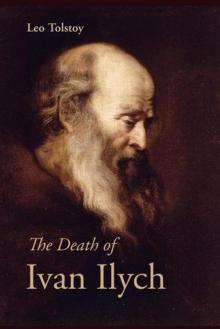 The Death of Ivan Ilych
The Death of Ivan Ilych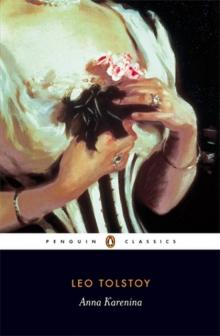 Anna Karenina
Anna Karenina Resurrection
Resurrection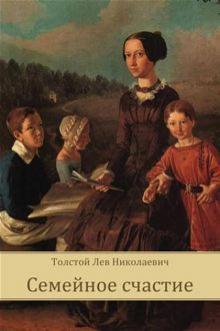 Family Happiness
Family Happiness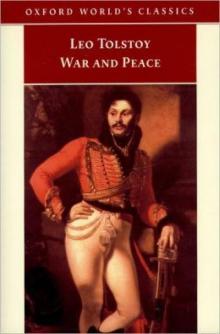 War and Peace
War and Peace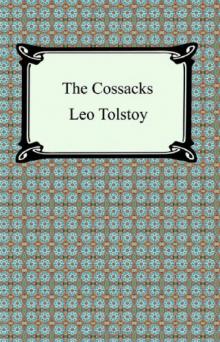 The Cossacks
The Cossacks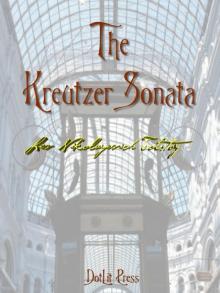 The Kreutzer Sonata
The Kreutzer Sonata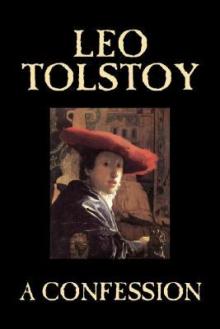 A Confession
A Confession The Kingdom of God Is Within You
The Kingdom of God Is Within You Father Sergius
Father Sergius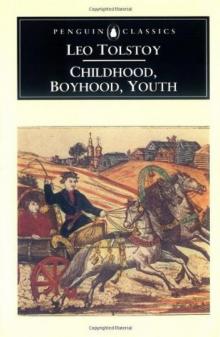 Childhood, Boyhood, Youth
Childhood, Boyhood, Youth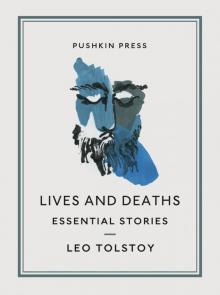 Lives and Deaths
Lives and Deaths The Devil
The Devil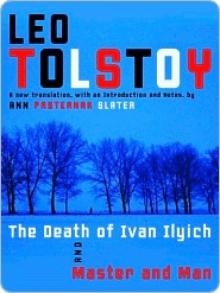 The Death of Ivan Ilyich and Master and Man
The Death of Ivan Ilyich and Master and Man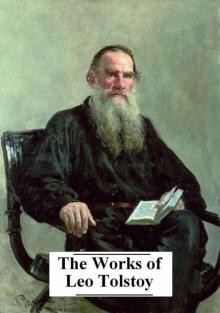 The Complete Works of Leo Tolstoy (25+ Works with active table of contents)
The Complete Works of Leo Tolstoy (25+ Works with active table of contents)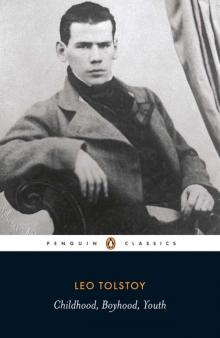 Childhood, Boyhood, Youth (Penguin ed.)
Childhood, Boyhood, Youth (Penguin ed.)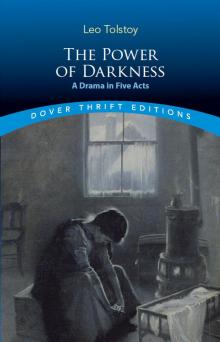 The Power of Darkness
The Power of Darkness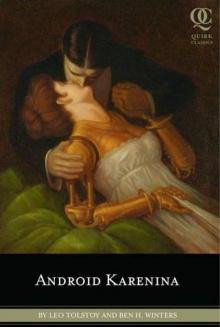 Android Karenina
Android Karenina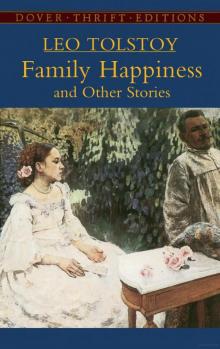 Family Happiness and Other Stories
Family Happiness and Other Stories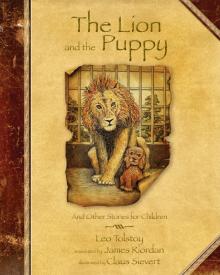 The Lion and the Puppy
The Lion and the Puppy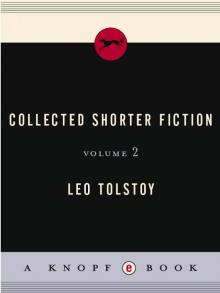 Collected Shorter Fiction, Volume 2
Collected Shorter Fiction, Volume 2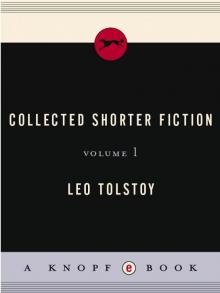 Collected Shorter Fiction, Volume 1
Collected Shorter Fiction, Volume 1